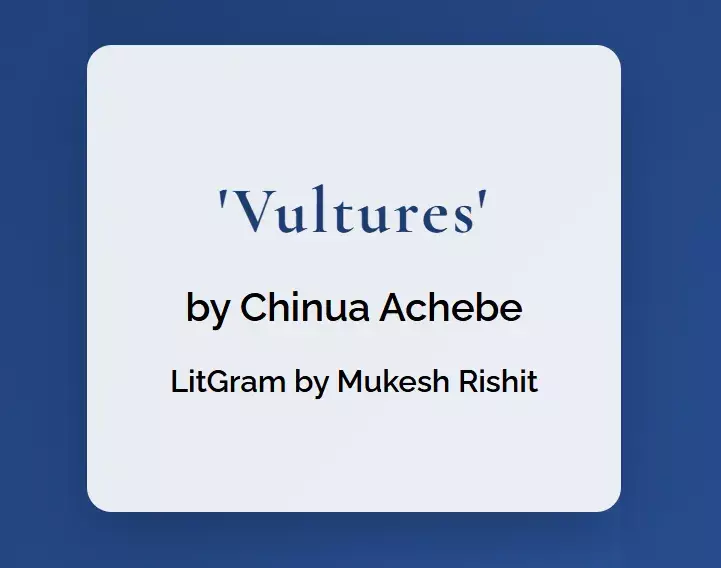Ever thought about how a poem can both disgust and fascinate you? Step into the realm of Chinua Achebe’s “Vultures” — a work of art that tests our views on right and wrong, and makes us face the intricacies of what it means to be human.
The Writer Behind the Words
Before we explore the poem, let’s take a moment to appreciate the literary giant who wrote it. Chinua Achebe known as the father of modern African literature, was a Nigerian novelist, poet, and critic. His works, including the groundbreaking novel “Things Fall Apart,” have shaped the scene of African literature and continue to have an influence on readers and writers around the world.
“Vultures”: An Overview
“Vultures” is a strong example of writing after colonial times that uses clear images to look at how love and cruelty live side by side in people. The poem puts the loveless life of vultures next to the ability for kindness in a Nazi commander — a comparison that leaves readers uneasy and thinking.
Breaking Down the Main Ideas: Key Themes in “Vultures”
The Fuzzy Lines of Right and Wrong
Achebe creates a picture of unclear morals throughout the poem. The vultures often seen as signs of death, show a moment of softness:
"...signs of death's complete disregard for human suffering ...took the eyes from a bloated body in a flooded ditch and consumed its innards"
But in the following verse, we find them “cuddled up to their partner” in “total harmony.” This contrast makes us rethink our views on good and evil.
How Complex People Are
The poem takes an unexpected turn when it brings in the Nazi commander. Achebe shows a person who can do both horrible things and simple acts of love:
“Thus the Commandant at Belsen Camp going home for the day with fumes of human roast clinging to his hairy nostrils will stop at the wayside sweet-shop and pick up a chocolate for his tender offspring”
This stark difference shows how complicated people can be making readers think about the good and bad sides everyone has inside them.
Symbolism: Deeper Meanings
The vultures play a big role as a symbol in the poem. People think of them as birds that eat dead things, but Achebe turns them into something more. They stand for how people can be both good and bad. The way these birds find “love” around death is like how humans can be kind even when there’s a lot of meanness around.
Post-colonial Perspective
As a post-colonial poem, “Vultures” criticizes the enduring effects of colonialism and war. The mention of Belsen Camp, a Nazi concentration camp, reminds us of the cruel acts humans can inflict on each other.
Achebe’s Writing Style: A Masterclass in Poetic Technique
Achebe’s writing in “Vultures” stands out as exceptional. He uses:
- Vivid imagery: The portrayals of the vultures and their surroundings are so lifelike, you can almost detect the scent of decay.
- Enjambment: The lines run into each other creating unease that mirrors the poem’s themes.
- Contrast: Achebe puts beauty and horror, love and cruelty side by side to boost the poem’s effect.
These methods work together to make a poem that packs a punch both in style and meaning.
Why “Vultures” Still Matters
In our world today where right and wrong often mix and people keep surprising us, “Vultures” stays important. It pushes us to:
- Think twice about what we believe about good and bad
- See the many sides in ourselves and others
- Think about how historical atrocities affect us today
As we deal with current moral and human rights issues, Achebe’s poem reminds us that humans can be both cruel and kind.
Facing the Unease
“Vultures” isn’t a poem you can read or understand . It aims to make you uneasy, to test what you believe, and to start tough talks. But this unease can lead to growth and better understanding.
When you next question good and evil or think about human nature’s complexities, turn back to Achebe’s “Vultures.” Its striking images and deep insights can guide you through morality’s gray areas.
Want to explore more African literature and post-colonial poetry? Dig into Chinua Achebe’s other works or find other African poets who challenge how we see things and expand our views. The poetry world is huge and waiting for you to discover!
Which parts of “Vultures” stuck with you the most? Tell us your thoughts in the comments and let’s keep this interesting talk going!



1 Comment
Pingback: "Tonight I Can Write": Pablo Neruda's Poignant Exploration of Love and Loss LitGram by MukeshRishit